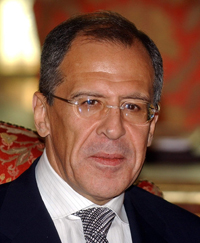Sergey Lavrov calls for talks on Iran crisis
Russia's foreign minister called for talks to resolve differences over how to proceed with the Iran nuclear crisis in comments released on Friday.

Sergey Lavrov said the talks should include Russia , the United States , China , the three European Union nations of France , Germany and Britain , which have been negotiating with Iran , and the U.N nuclear watchdog, the International Atomic Energy Agency.
In an interview with state television broadcast Thursday but published in full on the Foreign Ministry Web site on Friday, Lavrov said that "we all have to get together again to collectively find a new consensus regarding our strategy at the current stage."
Russia and China are resisting U.S pressure to move toward sanctions against Iran , despite the decision to send the Iranian nuclear dossier to the U.N. Security Council. Moscow and Beijing , both of which have veto power in the Security Council, have major commercial interests in Iran .
The Foreign Ministry declined to comment on the exact format for the proposed talks.
However, Lavrov's call for IAEA chief Mohammed ElBaradei to be included as well as Germany which is not a member of the Security Council appeared to indicate he meant the talks should take place outside the framework of the Security Council.
The five permanent members of the U.N. Security Council were scheduled to hold their second closed-door meeting Friday to discuss a proposed response to the Iranian nuclear crisis. The Americans hoped a statement could be adopted next week.
Measures could range from a mild statement urging compliance to sanctions or even military measures.
Russia believes that patient diplomacy can persuade Iran to slow down its nuclear program and assuage global suspicions that it is aimed at building weapons, while the United States and its European allies argue that Iran 's intransigence has left no choice but a tough Security Council action.
In an attempt to stave off sanctions against Iran , Moscow proposed to host Iran 's uranium enrichment program in an offer backed by both the U.S. and the European Union as a way to tighten controls over the Iranian atomic program.
But talks on the issue have stalled over Iran 's staunch refusal to re-impose a moratorium on domestic enrichment activity a condition that accompanied the Russian offer.
"Yes, the situation is critical, including because of the position of the Iranian leadership, which we do not approve of," Lavrov said.
"But it does not mean that everybody now has to go to the Security Council and start to issue calls, threaten and put such threats into effect," he said, reports the AP.
D.M.
Subscribe to Pravda.Ru Telegram channel, Facebook, RSS!


